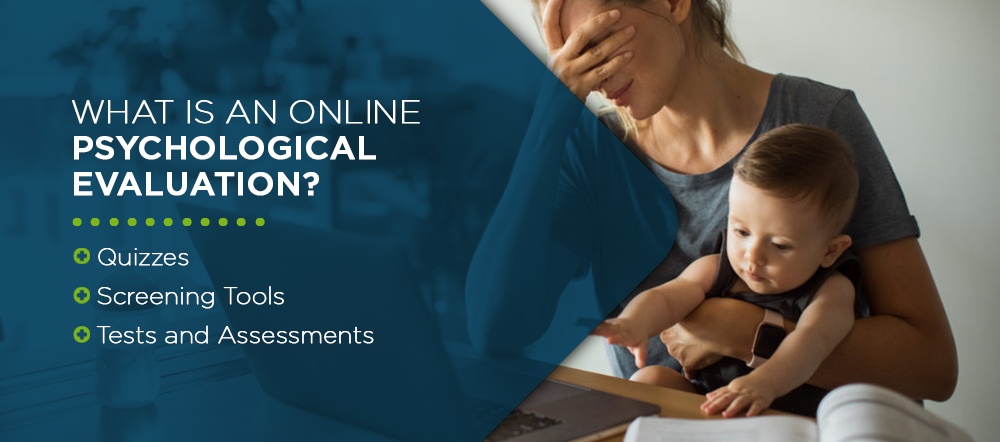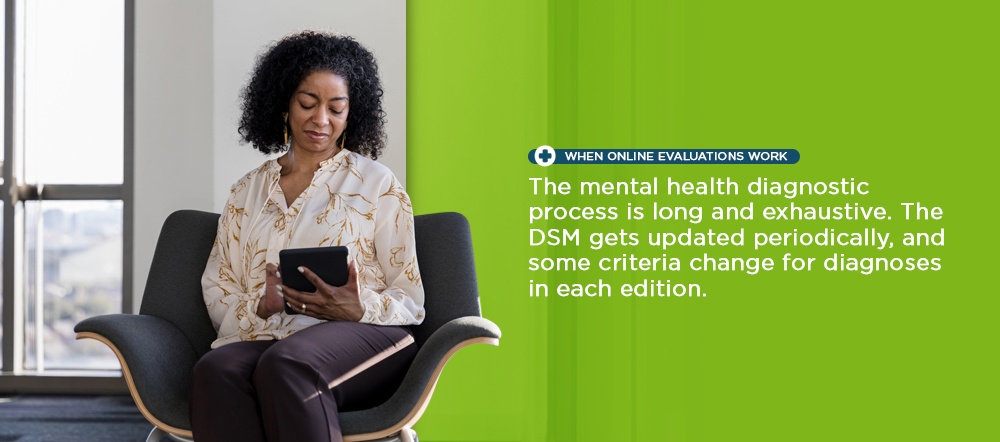How Helpful and Accurate Are Online Psychological Evaluations?
Accurate mental health diagnosis is the cornerstone of successful behavioral health practice. The process typically occurs in three phases. First, the clinician gathers detailed information from an initial interview. The information gathered should include symptoms, personal concerns, and life history. From there, the clinician narrows down the options using diagnostic guidelines codified in the Diagnostic and Statistical Manual of Mental Disorders (DSM) and selects the most appropriate diagnosis or diagnosis for the patient.
Ultimately, the diagnostic impression depends on a complex and sometimes lengthy process. Clinicians use an array of tools to arrive at a diagnosis, and one tool that is gaining attention is the online psychological evaluation. Are online psychological evaluations accurate? How valuable are they for clinicians and their patients? We’ll explore the effectiveness of this form of screening in-depth, explaining their benefits and drawbacks in a clinical setting.
Table of Contents
- What Is an Online Psychological Evaluation?
- Can an Online Assessment Give an Actual Mental Health Diagnosis?
- When Online Evaluations Work
- How to Address Online Self-Evaluations in Your Practice
- Types of Assessments Clinicians Use
- Why Digital Technology Matters in Psychology
- Get the Online Assessment Advantage With ICANotes
What Is an Online Psychological Evaluation?
We must first clear up a point of confusion. When talking about online psychological evaluations, there are three distinct categories we could be referring to, each with a different level of validity.
1. Quizzes
Anyone who uses social media is likely familiar with personality quizzes that appear on Facebook, Buzzfeed, and other outlets. These typically ask a few questions and spit out results like what TV character, musician or politician you are. However, among all the clearly facetious quizzes, you will find a few that claim to diagnose or evaluate mental health issues.
This type of quiz tends to conflate actual, valid mental or behavioral disorders with a personality type or individual quirk. For example, an online test might promise to tell you which mental disorders you have based on your answers to a few multiple-choice questions. The questions will likely be broad, so someone who indicates they enjoy cleaning might receive a result of obsessive-compulsive disorder at the end, for example.
Quizzes often treat legitimate mental health diagnoses as mere labels or individual personality traits, which makes them unreliable. Also, their treatment of mental and behavioral health is frequently stigmatizing. To identify a quiz, look for these qualities:
- Attempts at humor
- A brief question set
- Lack of explanation of results
- Arriving at a “diagnosis” no matter who takes the test or how they answer
Online quizzes are almost always clinically worthless, so we won’t count them in further discussion of online psychological evaluations.
2. Screening Tools
A much more valid form of online psychological evaluation often uses the quiz format but creates the questions based on actual diagnostic guidelines from the DSM. It’s common for mental and behavioral health providers to develop screening tools for potential patients who visit their websites. For example, depression, anxiety and addiction have relatively clear-cut symptoms that a short online screening can identify.
These tools can help get potential patients to think about their mental health and whether they need to make an appointment for further evaluation.
3. Tests and Assessments
Psychological tests and assessments are separate parts of a full psychological evaluation, and both can take place online. Tests are formal check lists or standardized questionnaires that have met specific research standards for their effectiveness at measuring specific traits or mental health disorders. Such tests are also called “norm-referenced.”
A formal assessment may involve one or more norm-referenced tests in combination with informal tests, observational data, medical records, and interview information. Some or all of these can take place online, including interviews through teletherapy appointments.
Can an Online Assessment Give an Actual Mental Health Diagnosis?
The only way to receive a valid mental health diagnosis is to work with a licensed mental health clinician for an accurate assessment. Online screening tools can be a helpful way to determine whether a person should seek diagnosis, but they are not a means of diagnosis in and of themselves. There are three main reasons screening tools and self-assessments are problematic.
Test Reliability
Even if a screening tool uses the DSM, it has not been peer-reviewed and therefore has no meaningful measure of successful diagnosis. Standardized tests have proven effective, but a clinician must evaluate these to produce a final diagnosis.
Self-Reporting Reliability
Self-reports tend to distort answers, leading to diagnoses that may be inaccurate in multiple ways. Someone taking an online psychological evaluation may come up against questions that make them uncomfortable, such as whether they spend money recklessly or have trouble socializing. In these cases, the person taking the test might begin focusing on what they want to be like, instead of objectively describing the way they truly behave. Standardized tests avoid this issue by wording questions in less apparent ways that self-assessments and screening tools can’t match.
Single-Source Bias
One essential aspect of a full psychological assessment is gathering information from different angles. The clinician may use one or more tests in combination with interviewing to come to their diagnostic conclusion. Self-assessments, however, may give the person the false idea that there isn’t much nuance to their symptoms. There is also the issue of contradiction. If someone takes two separate self-assessments or screenings and comes up with two different results, they won’t know how to interpret this. When a clinician administers multiple tests, they can use any apparent contradictions to advance the diagnostic process and continue narrowing down the potential diagnoses based on their professional interpretation.
For the most part, screening tools developed by professionals in the mental health field are useful for drawing attention to mental health and prompting people to consider pursuing a professional diagnosis. However, they are still no substitute for formal, standardized tests and psychological assessment.
When Online Evaluations Work
The mental health diagnostic process is long and exhaustive. The DSM gets updated periodically, and some criteria change for diagnoses in each edition. Even the foremost experts in the field disagree, making it clear a short screening is not enough to reach a definitive diagnosis of mental illness.
That said, some informal online evaluations are more clinically useful than others. The most effective screening tools and self-assessments have two things in common: They stick closely to the criteria listed in the DSM, and they offer to the reason for the results they produce. Psychology Today, for example, offers a mental health assessment based closely on the DSM. It contains a robust 60 questions, and at the end of the test, the participant receives a detailed evaluation of the symptoms as defined by DSM-5 criteria. This evaluation “works” in a sense because it can provide a clinician with many of the details they would need to make a diagnosis.
For an online evaluation to work in producing a diagnosis, it must be peer-reviewed and standardized, as well as administrated or further evaluated by a mental health professional.
How to Address Online Self-Evaluations in Your Practice
Receiving a tentative “diagnosis” from an online psychological evaluation is not a definitive answer. Someone taking one of these self-assessment tests may not have the diagnosis indicated, or might even have a different, though similar, condition. As a clinician, it’s essential to acknowledge that many people will take these tests and take whatever measures you can to let them know that there is no substitute for evaluation by a professional.
If your website features self-assessment tools that you have designed yourself or taken from a reputable source, be sure to include a strong disclaimer about the limited use of such online evaluations before the beginning of the test. A sample disclaimer could read something like:
- “By completing this self-assessment, you acknowledge that the results you receive are not a mental health diagnosis. If you are experiencing any of the symptoms listed in this evaluation, consult a licensed mental health professional for a possible diagnosis.”
It is also a good idea to reach out to people who may have taken a self-assessment even if you don’t offer them yourself. People who take self-assessments are often worried that they may be diagnosed with a mental illness but too afraid of stigmatization to take the next step and reach out to a mental health professional. Consider leaving an encouraging message on your contact page like:
- “Have you taken an online psychological evaluation? That’s a great first step to taking charge of your mental health. Let us know what your concerns are, and we will go over them in detail during your first consultation.”
This approach lets potential patients know that although the concerns they have over the results of an online self-assessment are valid, they need to be confirmed in a professional setting. With online evaluations, walking the line between welcoming concern and discouraging self-diagnosis is key.
Types of Assessments Clinicians Use
After someone completes an informal psychological evaluation online and comes to you for further advisement, you should administer a more formal, clinically relevant assessment. Clinicians use a wide range of standardized assessment tools that provide significant insight into the mental health of patients and act as starting points for the diagnosis and treatment of mental disorders.
These formal assessments give clinicians information on what patients are struggling with and concerned about, as well as how that affects their habits and behaviors. Tests help clinicians build a strong profile of each individual to create a more holistic view of mental well-being. Here are just three of the many categories of clinical assessments, along with some examples of tests within each.
1. Anxiety
Because there are multiple types of anxiety, it’s crucial to pinpoint the exact type a patient has to provide the most appropriate treatment. These assessment tools help narrow down the options:
- Zung Anxiety Scale
- Hamilton Anxiety Rating Scale
- Generalized Anxiety Disorder Screener
- Depression Anxiety Stress Scale
2. Behavioral
Behavior is a critical element of a proper diagnosis. Behavioral assessment tools give clinicians insight into how a person acts, what they do on a typical day, what habits they have, and other essential information. Mental health professionals typically use behavioral assessments in conjunction with other tests to clarify symptoms. Some behavioral assessments people can complete online include:
- Parental Stress Scale
- Wahler Self-Description Inventory
- Daily Living Activities
3. Addiction
Substance abuse and addiction are common reasons for people to seek help, and multiple tools address this diagnosis. A clinician looking to evaluate the severity of a substance use disorder might use:
- Addiction Severity Index
- Drug Abuse Screening Test
- Brief Addiction Monitor
- Alcohol Use Disorders Identification Test
Why Digital Technology Matters in Psychology
Traditionally, clinicians have administered all the assessment tools listed above and more in person and on paper. Why move to a digital, online format for psychological testing? The following benefits of digital technology explain its importance in psychology.
Accessibility
Today, almost everyone is online. Only 10% of Americans claim not to use the internet at all. Digitized mental health services allow anyone with an internet connection to receive mental health care regardless of their location. Increasing access to mental health is a critical concern in the field of psychology.
Immediate Feedback
When a patient completes a pen-and-paper test, someone must manually score or grade the results. Not only does this take the clinician significant time in many cases, but it also means the patient has to wait longer to receive their results. Taking a test, especially an exhaustive one like the Minnesota Multiphasic Personality Inventory, can be somewhat stressful. Having to wait to receive results can increase anxiety levels, which may affect patient retention. With online assessments, results are typically available immediately through the patient portal.
More Efficient Testing
A significant advantage of online assessments is their efficiency. With paper tests, the patient must be physically present. That means making an appointment and taking extra time to account for transportation, which can end up being an unnecessary drain on a patient’s time. Administering assessments online gives the patient greater flexibility to take the test. Additionally, being able to take a test in a chosen environment, rather than being “on the spot” at the clinician’s office, may result in improved psychological evaluation accuracy that provides better clinical value for eventual diagnosis.
Helping People With Disabilities
Those with disabilities may benefit from online psychological evaluations in a variety of ways. A disability like Parkinson’s disease may physically prevent a person from taking a test with ease, for example. Alternatively, a person with autism or misophonia might find the sensation or sound of a pencil on paper aggravating their sensory sensitivity. Digitized tests can help people with disabilities receive essential evaluations under optimal, accessible circumstances.
Get the Online Assessment Advantage With ICANotes
Online self-evaluations can and do have their place in psychology. While they are not diagnostic tools, they often provide people with insight about themselves and potential disorders they should investigate with the help of a qualified clinician. Standardized online assessment tools, on the other hand, provide exceptional value to both patients and clinicians.
ICANotes is a mental and behavioral health EHR platform that integrates online assessments with a patient’s health record, where they are both secure and easily accessible. Our EHR gives clinicians access to more than 75 digital rating scales, checklists, standardized tests and other behavioral assessment tools for both adults and children.
To learn more about ICANotes and the broad array of online psychological evaluation tools available, we invite you to watch a live demo or try the software yourself with a free trial.
Related Posts
How Online Searches Fuel Health-Related Anxiety
Will Insurance Companies Pay for Video & Phone Therapy Sessions?





